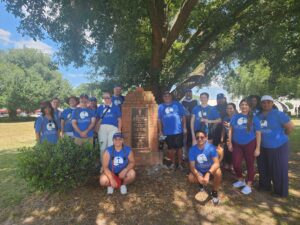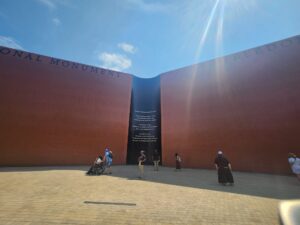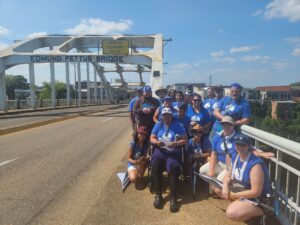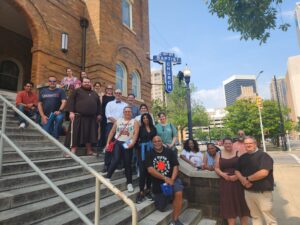This past August, Dean Scott Bader-Saye, Dr. Gustavo Bárcenas, the Rev. Madeline Hawley, and the Rev. Nancy Frausto led the annual Jonathan Daniels Civil Rights Pilgrimage to Alabama. Fourteen Southwest students attended the pilgrimage. This year’s pilgrimage was sponsored through a partnership between Seminary of the Southwest and Episcopal Divinity School.
The pilgrimage visited the Equal Justice Initiative Legacy Sites, and many historic sites associated with the civil rights movement, including the Dr. Richard Harris House, the Edmund Pettus Bridge, and Sixteenth Street Baptist Church in Birmingham.

“It was a privilege to join SSW students and faculty on the civil rights pilgrimage this year,” reflected Dr. Scott Bader-Saye, dean and president. “As we moved through the monuments and memorials created by the Equal Justice Initiative, the sadness and horror of the history of slavery, Jim Crow, racial terror lynchings, and mass incarceration settled heavy on us. But alongside this were signs of hope and joy – the most profound for me coming from our visit to the Dr. Richard Harris House, where we heard a first-hand account of how key civil right leaders, Rosa Parks, Martin Luther King, Jr., and John Lewis, among others, sat together at the very tables where we were sitting to strategize next steps for the movement (after which they would dance to the jukebox in the upstairs playroom). This ordinary house and ordinary kitchen became a place where real people (not giants or superheros) did extraordinary things. It inspired me to imagine what extraordinary things have been given to us to do in our historical moment and how we can bring people together to strategize and play and tend wounds and share food in the service of beloved community.”

Dr. Gustavo Bárcenas, Assistant Professor of Counselor Education, shared, “The civil rights pilgrimage has been, in many ways, a growing experience for me. Particularly, I feel I gained a deeper understanding for the word “love”. Love as a strength, love as source of resilience, love as a way of resistance, love as a powerful way to fight inequality and achieve justice. As an instructor at the seminary, I hope I can honor those who sacrificed their lives during the civil rights movement not only by practicing love in the latter ways but also by transmitting that same meaning to my students.”

The fourteen Southwest students attending the pilgrimage were from both the Master of Divinity and Master in Mental Health Counseling programs and were able to share a diversity of perspectives.

“This pilgrimage has given us the opportunity to reflect on where the Spirit is leading us in the quest for reparative justice, a term offered by one of our students on the trip that resonated with me about the ongoing transformative nature of this work,” reflected the Rev. Madeline Hawley, Director of Field Education and Lecturer in Pastoral Theology. “Walking on the hallowed ground where significant civil rights demonstrators marched for justice collapsed time. In the parks and on the bridges where they marched, we could feel their courage and the pain of the violence they were met with, and we were awed by their resolve in the midst of grief. Thinking about the steady beat of weary feet connected me back to the steady beat of Jesus’ feet. Kosuke Koyame reminds us in the Three Mile an Hour God that in Jesus, God walked among us at human speed — roughly three miles an hour. God has a speed, and it is slow, steady, and unwavering. An old Air Force saying of my husband’s is that slow is smooth, and smooth is fast. The work of justice seems so painfully slow, but I am reminded that God moves slow and steady, inviting us to drop into the marcher’s line and follow in our day and time.”

